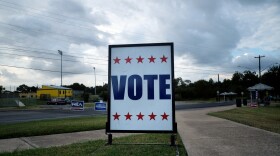Gov. Greg Abbott and Lt. Gov. Dan Patrick are far ahead of their Republican primary opponents in the latest University of Texas/Texas Tribune Poll, but the Democrats running for those two high offices face more difficult paths to their party’s nomination.
Two other statewide Republican incumbents — Land Commissioner George P. Bush and Agriculture Commissioner Sid Miller — have the support of a majority of likely primary voters, but with a caveat. When those voters had the option of saying they weren’t ready to make a choice, 44 percent listed no preference in the land race and 60 percent said the same in the agriculture race.
With high numbers of undecided voters, Bush led his primary with 36 percent of the vote, and Miller led his with 27 percent. Only when they were asked how they’d vote if they had to make a choice now did the majorities appear for the incumbents.

Bush got 57 percent. His predecessor at the General Land Office, Jerry Patterson, got 31 percent. The other two Republican candidates — Davey Edwards and Rick Range — each got 6 percent.
“I don’t think people know anything about [Bush] but the name,” said Daron Shaw, co-director of the poll and a government professor at the University of Texas at Austin.
In the Democratic primary for that office, Miguel Suazo got 68 percent of the support from likely primary voters, while Tex Morgan trailed with 32 percent. Those two candidates are unfamiliar enough that 56 percent of voters, given the chance, said they haven’t yet made a choice in that contest.
In his race, Miller had the support of 54 percent of voters asked whom they would choose now, followed by challengers Trey Blocker, with 26 percent, and Jim Hogan, with 20 percent.
Shaw said the Republican races for land and agriculture could both end up in May runoffs — often a sign of trouble for an incumbent officeholder. “I’m dubious of anybody — an incumbent — who’s not over 60 percent at this point,” he said. “If you’re not committed to an incumbent by now, are you going to commit to them?”

Republicans higher on the ballot have fewer things to worry about.
Abbott has two relatively unknown opponents, and it shows in his numbers: 95 percent of likely Republican primary voters said they would support the governor in an election held now. Patrick, who faces Scott Milder in the GOP primary, has the support of 88 percent of those voters. In each case, the top two state officeholders are well known enough to lower the number of undecided voters to 15 percent in Abbott’s case and 19 percent in Patrick’s.
“There’s not a lot of sign of hesitation here,” said Jim Henson, who heads the Texas Politics Project at UT-Austin and co-directs the poll. “It’s not like many Republicans are keeping their powder dry when it comes to the Abbott, Cruz and Patrick races.”

U.S. Sen. Ted Cruz is eclipsing four opponents in his GOP primary race, with the support of 91 percent of those polled. And U.S. Rep. Beto O'Rourke is running well ahead of two opponents in the Democratic primary, with 73 percent of likely primary voters saying they would vote for him in an election held today.
The Democratic primary for governor is a muddle, with two clear frontrunners and no candidate close to enough votes to win without a runoff. Former Dallas County Sheriff Lupe Valdez had the support of 43 percent of likely primary voters responding to the poll, while Andrew White of Houston had 24 percent. If no candidate gets a majority, the top two finishers will go to a May runoff. Grady Yarbrough and Tom Wakely each got 7 percent in that primary poll, Adrian Ocegueda and Jeffrey Payne got 5 percent, and Cedric Davis Sr., Joe Mumbach and James Jolly Clark each got 4 percent or less.

The Democratic race for lieutenant governor won’t end in a runoff — there are only two candidates. But their names are similar — Mike Collier and Michael Cooper — and their numbers are close. Collier, whose name was on the statewide ballot four years ago when he ran for comptroller, got 55 percent in the latest UT/TT Poll. Cooper got 45 percent.
“You have two lieutenant governor candidates whose names are very similar to one another, who have received very little public attention and who are not very well known,” Henson said.
Like some of the statewide Republicans, Democrats face some soft support. In the governor’s race, 66 percent initially said they had not decided how they would vote in this year’s primary. In that round, Valdez had the support of 18 percent and White had 11 percent. In the race for lieutenant governor, 64 percent hadn’t made their final choices; Collier led Cooper 27 percent to 9 percent.
“On the Democratic side, this is a pretty unformed primary,” Henson said. “Democratic candidates are still finding it difficult to operate in a vacuum of public attention. When 66 percent of Democrats don’t have an opinion in their top-of-the-ticket race, you’re not reaching your voters.”
The University of Texas/Texas Tribune internet survey of 612 Republican and 453 Democratic primary voters was conducted from Feb. 1 to Feb. 12 and has an overall margin of error of +/- 3.96 percentage points for Republican trial ballots and +/-4.60 percentage points for Democratic trial ballots. Primary voters were identified based on their participation in a Texas primary election in 2012, 2014, or 2016. Numbers in charts might not add up to 100 percent because of rounding.
__________________________________________






